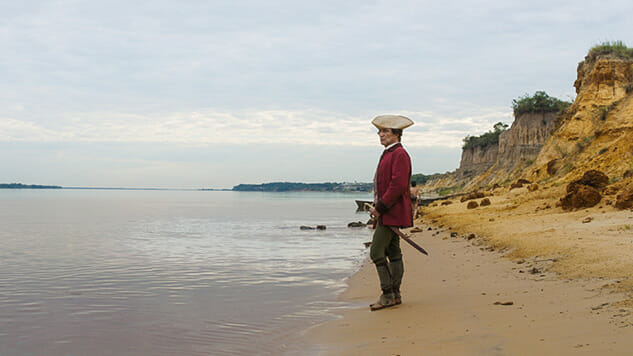Zama

Early in Lucrecia Martel’s Zama, her dreamy intent and languid images begin to nestle into place. First we witness Spanish corregidor (“mayor”) Don Diego de Zama (Daniel Giménez Cacho, whose eyes bear lifetimes of disappointment and resignation) on the shore of a nondescript river, in charge of a desolate Spanish colonial outpost in the middle of nowhere South America, though he seems to be more inhabiting it than litigating its quotidian. Catching a group of native women bathing, he steals a glance but is immediately found out, chased from the beach. Slapping one of the women to assert his dominance, Zama’s violent reaction feels preposterous, the response of a person with no control over himself, or his lot in life. This land rejects this sad man.
Then, some time later—Martel offers no real idea of how much time elapses between scenes, weeks measured only in facial hair and subconscious notions—Zama shows up for work. A native prisoner, his dark skin portending something ill in the middle of a cadre of lily white men sporting scrappy powdered wigs, appears to be on trial—for what, it doesn’t matter. When Zama’s second in command, the lithe and cocky foil, Ventura Prieto (Juan Minujín), releases the prisoner due to a lack of confession, or any hint of a crime (perhaps because he’s black, Martel implies), the prisoner runs head-first into a wall. Lying on the floor, reminded he’s still under oath, the downed man croaks, “There’s a fish that spends its life swimming to and fro. Fighting water that seeks to cast it upon dry land. Because the water rejects it. The water doesn’t want it.”
The metaphor, cryptically uttered by the concussed man, applies as well to colonialism as to Zama himself. All Zama wants is for his superior, the sweaty and evasive Governor (Daniel Veronese), to write him a letter to the Spanish Crown, recommending Zama’s transfer to somewhere, anywhere, less physically taxing and more civilizationally minded, preferably to Buenos Aires, where Zama’s wife and small children wait, deigning to send him letters. Shuffled about by a barely functioning bureaucracy, Zama wanders from room to room, portico to portico, slaves and natives and colonists alike eyeing him wherever we goes with barely veiled, wordless displeasure. No one says anything as to why they don’t like Zama much. It’s just a feeling we have about a feeling they have.
Martel and cinematographer Rui Poças (whose worked with Miguel Gomes and, recently, with João Pedro Rodrigues on the exquisitely pretty The Ornithologist) dedicate nearly every frame to Zama’s melancholy maundering, though rarely allowing him the dignity to ever be the most interesting figure in any particular shot, that is, when they aren’t up close, searching his lined mug for something representing courage or assertiveness. Stranded in a thankless government job, not so much forgotten by the system as just avoided, Zama is a colonist renounced by both the colonized and colonizers. Zama is literally post-colonial: Colonists negate Diego de Zama’s colonialism by negating him, an equation Martel and Poças externalize by photographing with foreboding beauty the jungle around the pathetic man, reducing him to a meaningless, replaceable figure amidst effortlessly mighty landscapes.
-

-

-

-

-

-

-

-

-

-

-

-

-

-

-

-

-

-

-

-

-

-

-

-

-

-

-

-

-

-

-

-

-

-

-

-

-

-

-

-








































